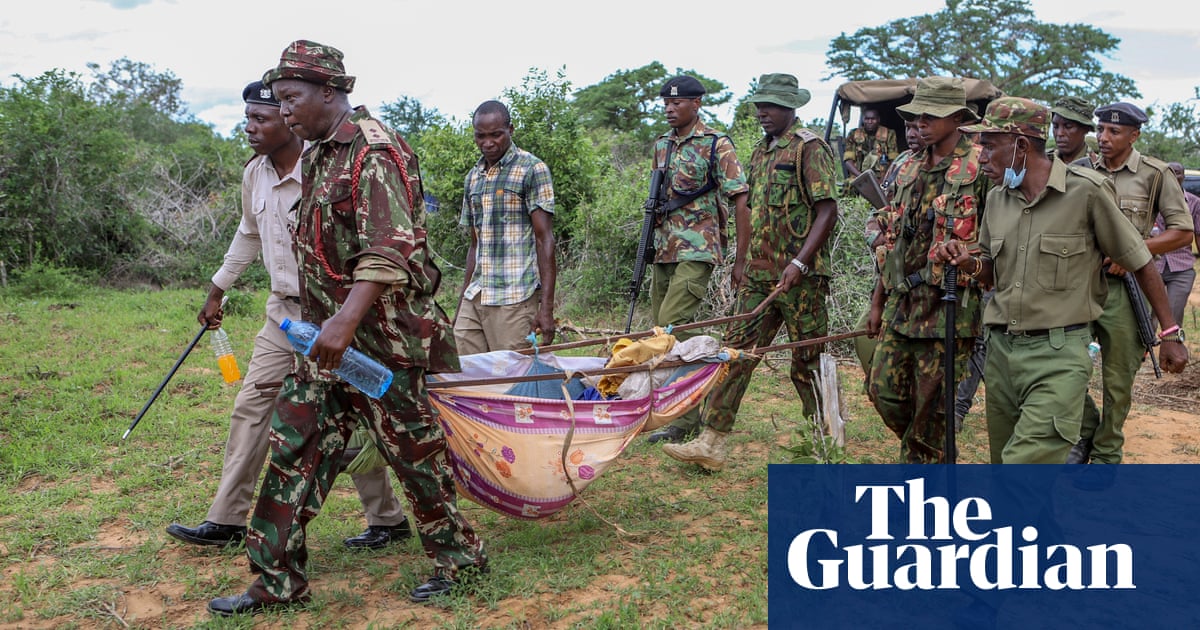
Two years ago, Issa Ali’s mother took all her belongings and left her family to join followers of the charismatic church leader Paul Mackenzie Nthenge in the Shakahola forest in south-east Kenya.
“He told them that’s where Jesus’ second coming will happen,” the 16-year-old said.
When he saw his mother again earlier this year, he said she was “nearly unrecognisable”, and had gone from being well built to shockingly frail.
“She told us it could be the last time we would see her, that her earthly life had lost all meaning and that she would be going to heaven soon. We tried to stop her, but couldn’t – she wasn’t herself at all,” Ali said.
The next time he heard of his mother was when his friends told him last week that she had been found dead in shallow graves in the forest, although her death has not yet been officially confirmed to him.
Ali’s mother’s apparent fate is just one story among scores in the case of a “starvation cult” – led by Nthenge – that has gripped and shocked Kenyans since police began unearthing corpses in the forest about two weeks ago.
On 15 April, one day after police raided the forest following a tip-off, Nthenge was arrested on suspicion of luring his followers into the remote area and brainwashing them into fasting to the death in order to “meet Jesus”.
The Shakahola forest has been declared an active crime scene and is cordoned off. A dusk to dawn curfew is in place. Nthenge is in police custody pending a court hearing, as are a few other men suspected of conspiring in the mass killing.
Hassan Musa, a Kenya Red Cross regional manager, said that by Friday 410 people had been reported missing by their loved ones, including 227 children under the age of 18 years. So far more than 100 bodies have been discovered.
As the scale of the deaths emerged last week, the town of Malindi, roughly 50 miles from the forest and known for its sandy white beaches and Swahili-inspired architecture, was thrown into a state of unease.
Fear and speculation dominated conversations in market stalls, bars and hotels as distressed families filled in missing person reports at police stations, or queued at public hospitals and even morgues in an attempt to find out if they had lost a loved one to the cult.
Some had travelled hundreds of miles, including Rogers Mwibo, 30, who had come from the Kenyan capital, Nairobi. Mwibo said his understanding was that two of his missing family members were probably dead and that the whereabouts of a third were unknown.
Mwibo came to the town after watching families of the cult’s victims on TV describe similar behavioural changes in their loved ones to those he had witnessed in his mother before she went missing.
“After Mum joined the church, she used to talk about Jesus all the time,” he said. “She used to even tell me to quit my job because it is not important, saying that I should follow her because Jesus is coming back soon.”
Also in Malindi was Joyce Makori, 38, who counted herself among the fortunate few after finding her husband, Daniel, alive on a roadside by the Shakahola forest.
The couple had grown apart after nearly a decade of marriage when he left her and his children for the cult, though they occasionally spoke over the phone. Makori said that in recent years she had been disturbed by his behaviour. For instance he was adamant, she said, that the world would be ending in June this year.
When news broke of the bodies being found, she decided to try to find him. In the days just before his rescue last week, she said he gave the sense over their phone call that he was under threat.
“Where it has reached, I am going to die,” she recalled him saying. “They have taken away my phone and suspect that I am sharing information outside. On this path I am on I could either be captured, die in the forest or be killed … I can’t leave.”
Makori said she had had a tough time trying to persuade the local authorities to help her locate her husband. She carpooled to Shakahola with 10 other people who also wanted to look for their families, and eventually got some help from the police once she had determined his general location.
Many other cult followers are still believed to be in the forest. Local activist Victor Kaudo, who helped tip off authorities to the cult’s activities, has raised concern over the pace of the rescue missions. The activist and some followers’ families say that exhuming bodies has been prioritised over trying to rescue survivors.
“Everyday we are losing lives,” said Kaudo. “There are many more people there who need our help.”
President William Ruto, whose administration has been perceived as religious-leaning, strongly condemned Nthenge’s cult as a fringe movement, comparing rogue pastors like Nthenge to terrorists who “use religion to advance weird, unacceptable ideology”.
Rescue teams report that Nthenge’s following had wide reach: his followers were not only locals but people from across the country, with a handful from other African countries, including Tanzania, Uganda and Nigeria.
Thirty-four cult followers have been rescued so far, a number in a critical condition. A few others died before they made it to the hospital. The survivors – some of whom tried to resist rescue efforts – were taken to private facilities, such as local schools, where they are receiving counselling. Sources in close contact with the victims say that a number of them have refused to address recent events, and that others are traumatised or don’t buy into suspicions of wrongdoing on Nthenge’s part.
Additional reporting by Ventura Kireki
https://news.google.com/rss/articles/CBMidGh0dHBzOi8vd3d3LnRoZWd1YXJkaWFuLmNvbS93b3JsZC8yMDIzL2Fwci8zMC93ZS10cmllZC10by1zdG9wLWhlci1rZW55YW4tdGVlbmFnZXItdGVsbHMtaG93LWN1bHQtc3RhcnZlZC1oaXMtbW90aGVy0gF0aHR0cHM6Ly9hbXAudGhlZ3VhcmRpYW4uY29tL3dvcmxkLzIwMjMvYXByLzMwL3dlLXRyaWVkLXRvLXN0b3AtaGVyLWtlbnlhbi10ZWVuYWdlci10ZWxscy1ob3ctY3VsdC1zdGFydmVkLWhpcy1tb3RoZXI?oc=5
2023-04-30 13:24:00Z
1950026609
Tidak ada komentar:
Posting Komentar